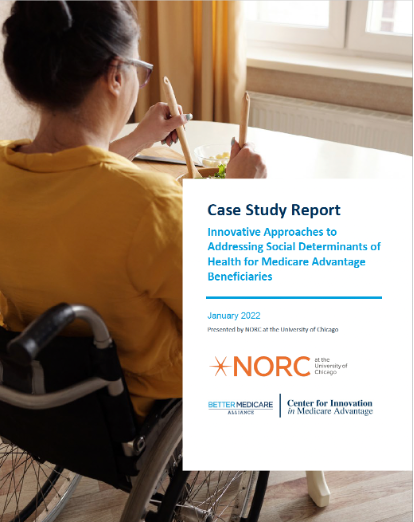Case Studies Highlight Innovative Approaches to Addressing Social Determinants of Health for Medicare Advantage Beneficiaries
New research from NORC at the University of Chicago profiles thirteen best-in-class approaches to SDoH from Medicare Advantage plans, providers, and community partners

Washington, D.C. – As enrollment in Medicare Advantage swells to more than 28.5 million seniors and individuals with disabilities, new research conducted by NORC at the University of Chicago and commissioned by Better Medicare Alliance’s Center for Innovation in Medicare Advantage highlights best practices in addressing social determinants of health (SDoH) for Medicare Advantage beneficiaries.
NORC’s research compiles 13 case studies based on interviews with 12 leading Medicare Advantage plans, provider groups, and community partners; offering valuable insights to policymakers as they seek to integrate lessons learned from the COVID-19 response and assess how to best address the needs of an increasingly diverse Medicare population.
Case studies focus on three areas:
- Data Sources and Beneficiary Identification: The ability and act of transmitting information about beneficiaries’ social risk factors between health plans, providers, and community-based organizations to understand SDoH needs.
- Intervention: Action taken by health plans, providers, and their partner organizations to address areas of SDoH needs.
- Evaluation: The tracking of health outcomes and return on investment associated with interventions used.
Organizations profiled in the report include Aetna, ChenMed, Healthify, Humana, Meals on Wheels America, NowPow, Partners in Care Foundation, SCAN Health Plan, SNP Alliance, SummaCare, UnitedHealth Group, and Unite Us.
“Research shows that SDoH can account for up to 55% of an individual’s health outcomes. Doing right by beneficiaries means devoting attention to clinical and social needs – not just one or the other. We can be proud that Medicare Advantage is leading the way in what must be a system-wide shift in health care delivery,” said Mary Beth Donahue, President and CEO of the Better Medicare Alliance. “With enrollment in Medicare Advantage among dual-eligible beneficiaries increasing by 125% from 2013 to 2019 alone, the need for innovative approaches to address the social risk factors of a growing and increasingly diverse beneficiary population cannot be overstated. Fortunately, Medicare Advantage is rising to the challenge. As these case studies show, health plans, providers, and community partners are leveraging Medicare Advantage’s flexible benefit structure to deliver whole-person care that is making a meaningful difference in the lives of seniors.”
“In recent years, Medicare Advantage plans have taken significant steps to address the SDoH needs of their beneficiaries. In doing so, plans have often formed innovative partnerships with providers, technology companies, and community-based organizations to advance their efforts,” said Dianne Munevar, MPP, Senior Director of Health Care Strategy at NORC. “As these case studies demonstrate, many of these interventions are now proving successful for beneficiaries – providing lessons for policymakers that can be applied throughout the health care community.”
“ChenMed is proud to participate in this research and share how, working hand in hand with Medicare Advantage, we are incorporating social work directly into the clinical setting,” said Colleen Mourra, MSW, Associate Director of Population Health Management for ChenMed. “ChenMed primary care providers form deep connections with their patients, using frequent touchpoints, formalized Health Risk Assessments (HRA), and data analysis to uncover the true barriers to managing health. When social needs are identified, we can connect patients to our own in-house social workers who can readily intervene. This is one of many ways we fulfill what we believe is a moral imperative to address SDoH in the communities we serve.”
“Partners in Care Foundation was honored to share insights about our work alongside Medicare Advantage,” said June Simmons, President and CEO of the Partners in Care Foundation. “Our interventions and initiatives bridge the gap between social care and health care that in too many places remains a frequent part of the patient experience. We are particularly proud of our programs that work to bring aligned care coordination and SDoH services directly into patients’ homes and appreciate the flexibilities in Medicare Advantage that help make these efforts possible.”
“Beneficiaries enrolled in Special Needs Plans (SNPs) present unique SDoH challenges that deserve special care and attention. That’s why we’ve made SDoH a key focus of our Alliance; undertaking numerous efforts to identify and share best practices and lessons learned across our membership,” said Cheryl Phillips, MD, AGSF, President and CEO of SNP Alliance. “As we shared with NORC, our annual survey and our conferences provide us a window into our member health plans’ SDoH strategies, allowing us to monitor progress and refine our approaches. We are committed to continuing the progress Medicare Advantage SNPs have already made in this space.”
Read case studies from the report using an interactive digital feature here.
Read a PDF of the report here.
###
